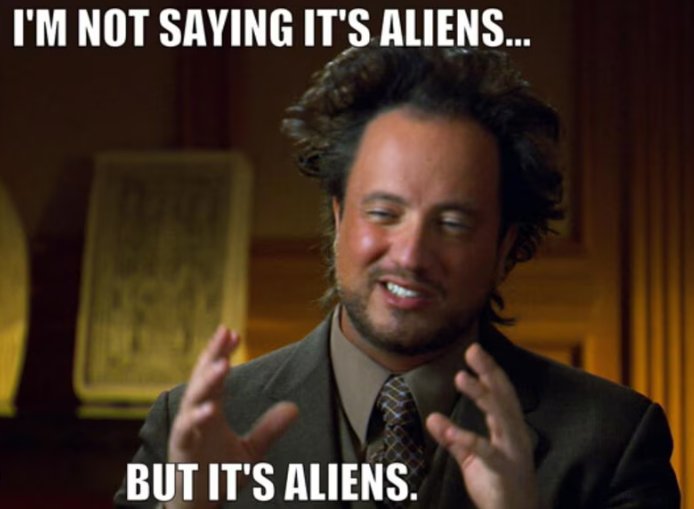Pirate Week Milestones, Mothership Vibes, Intraspecific Face Biting
Welcome, hearty friend, to the TEETH newsletter! This is a (mostly) weekly transmission about our adventures in the very secret land of Tabletop Roleplaying-Games. We have published a series of our own TTRPGs! Our latest book, GOLD TEETH, is on Kickstarter right now!
What appears within this letter is written and compiled by waif of the sea, Jim Rossignol, and master of the ocean, Marsh Davies. Come and join us over on the TEETH Discord! Free tooth emojis for everyone.
And hey, if you can wish to support us further and also get a fantastic 320-page RPG, you can BUY OUR ORIGINAL BOOK, if you aren’t already a member of that rather cool and highly exclusive club, that is.
Hello, you.
Links!
Mothership

Hello, you.
This week we’ve been busily launching harpoons into the depths of our imaginations to bring back morsels for the next book, which is currently creeping towards a rather nice round figure over on Kickstarter.
Yesterday we posted an update talking about some details for the book, including an art-heavy teaser for our playbooks, a link to a podcast we happened to be on, and a mysterious silhouette! Hmm!
There’s lots more where that came from, coming Quite Soon.
Love,
Marsh & Jim

LINKS!
THING OF THE WEEK: DEATH KNIGHT(!*) “is a solo tabletop RPG that plunges you into a dark and immersive world where a once noble knight fights against a curse in a land ruled by terror and despair. As the Death Knight, you’ll journey through shadowy caverns, cursed forests, and desolate wastelands, battling the malevolent forces of a powerful lich lord.” I’ve said it a hundred times, but there is nothing better than battling the malevolent forces of a powerful lich lord, and this is a particularly enticing take on that beloved trope.
Jon from Handiwork has written this announcing/explaining FiveEvil, a horror game based on D&D 5e. “It’s been suggested by a number of people on the ole socials that FiveEvil appeals as a cure for the more generally cosy feel that D&D seems to be headed towards.” He goes on to detail how things grow more intense as the game’s horror levels rise. A neat bit of indie-design grafted onto the D&D giant. As discussed elsewhere, this sort of rules-work really appeals to us. But then it would, wouldn’t it?
I can’t actually remember if we linked to Outliers before, I think maaybe we did, but I link again because it’s the solo-journaling game of doing weird academic research is still taking pre-orders and I think more people should be excited about it.
Oh and speaking of pre-orders, the page for MILESHIPS is still up for the time being. I’ve been working on this with McQue and seeing early drafts. God damn.
I really enjoyed this video about the changing English accent over the centuries, as a sort of sensible linguistics counterbalance to the speculations which met Talk Like A Pirate Day being this past week, with unfortunate people discussing what pirates actually sounded like.
Also in research this week: "Entelodonts partook in intraspecific face biting", which, as Marsh points out, is a sentence that makes less sense with each passing word. Oh those prehistoric hippo-o-hogawhales! I love them, but they make no sense.
Mothership. I Finally Write About Mothership.
I was poised to write something about Mothership a while back, but a couple of things gave me pause. Firstly, my group really wanted to play another game of it. We weren’t sure we were “playing it right”, and felt like we needed to give it another shake, just to make sure the wrinkles weren’t ones we’d put there ourselves. To be clear: the Mothership rules are explicit that there’s no “right” way to play, so I am not talking about simply misapplying the ruleset in any rigid way, but more that we hadn’t found the rhythm, or the correct invocation of the rules in a manner which worked for us as a group. Something was missing. What was missing? We wanted to figure it out. I worried that I hadn’t adapted my GMing style to the needs of the game, or that we were misunderstanding something fundamental.
Secondly, Quinns’ review got everyone excited again! He said we had to play more of the official modules, and so we decided to do so. And having done all that we might still play Time After Time, because it looks absolutely nuts.
To be extra doubly clear: we had great fun every time we played Mothership. The ending of my homebrew adventure about mind-controlling messianic space eels from another dimension was one of my favourite moments in any of our campaigns in any system, and the character deaths throughout were uproariously entertaining, not least because of Mothership’s much-lauded death mechanic. The plain truth of it all is that we wouldn’t have gone back for a third helping if fun hadn’t been had. I feel uneasy summarising, even now. Fun was had. And yet…
And yet however we played it, Mothership never fully, finally clicked. I never ended up recognising the game that other people said provided the promethean fire.
The trigger for writing this piece was that we finished Another Bug Hunt last night. It’s a clever module with enough twists on the premise (it’s Aliens) to keep everyone’s attention for the duration. Quinns was right that it’s a really solid introduction to the rules, reminding you to keep those fear checks flowing, so that the stress increases, and the sanity is tested, and the panic rules come into play. Tension increased, stress flowed, people died, it was a great tour of the game’s systems.

And yet that little burst of terminology there is indicative of the problems we ended up having with the game. Questions ruffled play. “So none of my skills are actually useful in this scenario?” Nope. “Why is sanity separated out from fear?” I guess it makes sense, I say. Because you might go insane, rather than simply be terrified? That’s a necessary sort of granularity for a horror game? Right? A half-convinced shrug in response.
There was a sense of incompletion. For us there remains a peculiar void in the game. The rulebooks for both player and GM (aka Warden) are truly packed with great rules, and even better suggestions for just running RPGs generally. But it feels constrained in a way I never really managed to work around or adequately articulate. (I’m trying here, so wish me luck.) Partly this is about what’s not there. And what is not there is not there by design. Mothership’s designers have addressed why there are no stealth rules, for example: “Because we wanted the most conversation around that part of the game.” They want you to face down the situation at the table, and for the GM to make rulings about what works in a specific circumstance a running-and-hiding character finds themself in. This is also why there aren’t any social abilities or rules. The same sort of reasoning must apply, perhaps even more to social stuff than to stealth. Talk it out at the table! Just do the role-playing part.
And dutifully we did so. My players like to create friction, tension, drama, and they played that out in characterful clashes, betrayals, discussions, conversations. Yet through it all they were nevertheless able to reason that we also did this in other games while applying the dramatic denouement of a roll to top out the process. Actions, rules, and abilities that other games had provided were both a prompt for what to do (by giving you a good chance of pulling it off) and a spice to heat things up by being offbeat, weird, or personal in a way that wasn’t down to fear or guns. In Mothership there’s nothing other than awkwardly applying a save to make a roll anything that isn’t fear, guns, or your limited range of skills. There just weren’t any good avenues for the resolution of those particular struggles. I totally understand why they aren’t there. The point of this game is that it’s lean to the point of being skeletal, except where terror and injury are in question. That’s the point of it. But it always felt like something was missing, because it was.
Similarly, others have made the point about the lack of rules about what Androids are, or how they work. We established a little about how androids work at the start of our game of Another Bug Hunt, only for the scenario to cause them to not really make sense, and for our brief excursion into worldbuilding to undercut some of what that adventure was trying to do. The Mothership ruleset does not want to explain what Androids are, fair enough, but the adventures we’re using to make the most sense of those rules certainly do. So I think I would have liked a little more here: if they can do a full booklet on ship combat rules, some at-least-optional android material would have been super useful. Because I want my game to run smoothly, and I want to have as much GM-scaffolding immediately to hand as possible. Don’t get me wrong: I am an inveterate improviser, I love to invent on the fly, we had fun with our eerie androids, but there are no good cues to take from the books. Which is by design. A void on purpose. Explicitly to fill with the fire of your own creation. And yet…
What all this amounts to, I suspect, is not that Mothership isn’t all they say it is, because it is an exciting, savage-unto-extremity (we had a player die instantly in a single dice roll on the first encounter of Another Bug Hunt), vibe-accelerant ruleset. But maybe these rules simply aren’t for us.
The same stuff that makes the vibes, breaks the vibes. It’s contradictory, sorry. But that’s how it was for us.
We understood the OSR-y approach of only making rolls when they were up against the wall, and applied it. And I fear this is what we are snarling up on. Personally, I really enjoy building dice rolls and the conversation surrounding them. There’s so much to be had from a negotiation about how this or that skill, talent, item, weapon, assist, or circumstance might apply, and while there’s certainly plenty of that in Mothership it also comes with peculiarly narrow constraints when you do roll a dice. A lookup table giving everyone the same neck injury in a single gunfight made me laugh, for example.
Dice rolls in Mothership are interesting by virtue of being hugely risky and likely to cause a fantastic amount of chaos, so they certainly can have fun consequences, but the entire process feels less than it might be in other games, and the options they provide to begin with are thin on purpose.
By contrast, a few different people have recently recounted to me how good the stress mechanic in the Year Zero Alien game is: adding dice to a pool that might have catastrophic fallout, but ultimately allowing you to do more as your character’s adrenaline builds under pressure. I haven’t played this, but this description immediately fired my imagination in a way that Mothership’s rules never really have, with their stress and skill mechanics being separated out, and always feeling like something was missing.
So yeah. It’s reasonable to say that despite these reactions we’ll play Mothership again. We can do this while recognising that it still hasn’t clicked, and that we find something incomplete at the heart of it. The game undeniably taps into something fundamental, and reaches for the messy core of what blue collar space horror should be about. And sometimes a game at the table is far more about the application of vibe than interpretation of the details, and I think that simple fact has carried all our games across numerous adventures. Ultimately our group has seized upon an opportunity to play eerie androids, nerve-wracked space marines, and asshole company men, and they’ve loved doing so. These are tropes so strong you can get high off them.
Perhaps that’s enough. And yet…
—
*This exclamation mark following that phrase marks an incredibly specific early-RPS lore callback there, in case anyone reading is actually of that era. For everyone else: please ignore me.
Add a comment: